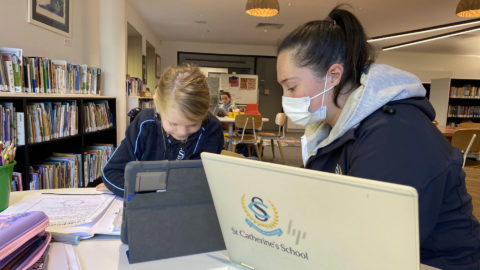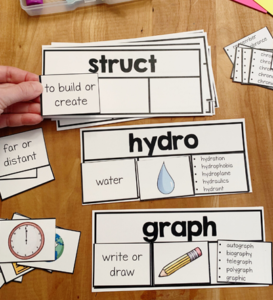Barbreck Update – Finding the Silver Lining

As we continue life through this extended lockdown, I am reminded of the saying “it is not what happens to you, but how you react to it that matters.” This is particularly true in times such as this, when we have no control over the circumstances in which we find ourselves.
Young children often do not have the ability to synthesise the information they receive from the outside world, relying on the people closest to them for reassurance, well-balanced perspectives and positive role modelling.
COVID has been, and continues to be, challenging. During this time, it is important our families and teachers caring for children exhibit positive responses and role model with optimistic language and behaviours.
As our families navigate through the current lockdown and ongoing COVID restrictions, I encourage parents to think of the perspectives their children may hold, and openly discuss their concerns and wrap them in the reassurance that all will be well.
Some conversation starters and activities to encourage positive behaviours with children may include:
- “It’s wonderful we have more time together as a family!”
- “Let’s make lunch together and eat as a family.”
- Creating ‘a day in the life’ for all members of the household to learn about each other and their daily experiences at work or school.
In turn, it is also important to acknowledge difficult situations and build resilience in children through reassurances such as:
- “We have things in hand and everything is going to be okay.”
- “This situation is a bump in the road of life.”
- “Although this is hard, there is always so much to look forward to.”
I would like to thank all of our Barbreck parents for your ongoing support and resilience working alongside our educators, both at School and during the Learn@Home program. Together, we are demonstrating to our young girls there is always a silver lining and something to be grateful for every day.
SPELLING AT BARBRECK
The Learn@Home program this week provides parents with an intimate view of the classroom teaching across the course of the day. With this in mind, it may be helpful for parents to understand the ‘why’ with some of the more technical decisions sitting behind programs embedded in the School programs.
 In the Barbreck classroom, we believe the best spelling programs are grounded in the theory of phonics. This well-researched approach supports students to build their spelling, reading and writing skills throughout their primary years. As such, our spelling programs incorporate the three main areas of phonic knowledge and application development, namely:
In the Barbreck classroom, we believe the best spelling programs are grounded in the theory of phonics. This well-researched approach supports students to build their spelling, reading and writing skills throughout their primary years. As such, our spelling programs incorporate the three main areas of phonic knowledge and application development, namely:
- Phonological development – being able to hear the sounds in a word and associate them with letters and letter combinations
- Visual knowledge – what words look like, such as the letters and letter combinations that make up a word
- Morphemic knowledge – understanding what a word means by breaking the word into its smallest units of meaning
Building from this, our spelling programs are enhanced in the upper primary years through etymological knowledge – understanding the meaning of word origins, for example Latin and Greek roots.
The spelling needs of girls change as they transition through school, with spelling becoming more complex and sophisticated in the upper primary years. To this end, we have tailored our choices of programs, and the professional development of our teachers, to promote the best practices in the teaching and learning of spelling.
Currently, there are three spelling programs utilised in the Barbreck programs.
Years Prep to 2: Sounds-Write Program
Young spellers develop skills in reading, spelling and writing through the first two knowledge areas: phonological and visual knowledge.
For these very important foundational learning areas, the Sounds-Write program was introduced earlier this year. It is an evidence-based linguistic phonics program and is a highly successful approach to the teaching of reading and spelling. Some examples include: when girls know blends and vowel combinations they can decode words such as ‘str’ + ‘ee’ + ‘t’ makes the word ‘street’ and ‘bl’ + ‘a’ + ‘ck’ makes the word ‘black’.
Years 3 to 4: Spalding Spelling
In these years, students have developed a comprehensive understanding of letters, sounds and the many combinations of sounds that make words. At this stage, they move away from sounding out words to building base words.
The Spalding Spelling program is utilised at this learning level, focusing on morphemic knowledge, including prefixes, suffixes, base words, plurals and tense use. For example, the parts in the word ‘un’, ‘break’ and ‘able’ that make up the word ‘unbreakable’.
Years 5 and 6: Spelling Mastery
In the senior years of Barbreck, girls are reading with a level of maturity and enjoy a range of interests to pursue through reading. The Spelling Mastery program allows students to consolidate previous spelling knowledge and introduces etymological knowledge (the history of words). For example, ‘hydro’ is Greek for water as is the Latin root ‘aqua’.
The spelling programs in the Barbreck classroom are carefully selected to best suit the stage and age of the learner, as well as programs we believe build the best foundation for ongoing spelling mastery. Should any parents like to learn more or discuss their daughter’s spelling program please feel free to contact either your classroom teacher or myself.
PARENT TEACHER MEETINGS
Parent-Teacher meetings were successfully held online this week. While we would have preferred to personally welcome parents into our School and classrooms, we hope our online conversations provided important information about your daughter’s learning development.
While the length of these meetings suit most, should you wish to organise an extended conversation, we ask that you contact your daughter’s teacher via email to organise a mutually convenient time.
I am hoping when I next write for The Blue Ribbon, we have good news about the lifting of restrictions. Until then stay safe and positive, encourage kindness and look for the silver linings.
—
Out of School Hours Care – Week 3 Activities
 Upcoming activities for Term 3 Week 3 detailed here.
Upcoming activities for Term 3 Week 3 detailed here.
St Catherine’s School offers an Out of School Hours Care program to all ELC and Junior School families. The program is implemented by our provider ‘After the Bell’, and operates within the ELC building. Parents are reminded that if you need to use the Before School Care or After School Care service, registrations need to be made in advance with ‘After the Bell’. Please allow up to five business days for your registration to be processed before your child can begin attending the program. Registration is free. All families are encouraged to register so that you can use this service in the event that you are unable to pick up your child.
Before School Care – 7.00am to 8.45am
After School Care – 3.00pm to 6.00pm
Registrations can be completed via the ‘After the Bell’ website.
Please phone 9758 6744 for all enquiries.


